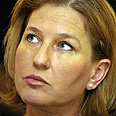
'Mossad beauty.' Livni
Photo: AFP
The Syrian state press has described her as a "Mossad beauty." A Palestinian cartoonist compared her to the Mona Lisa. One Canadian report called her "naturally blonde with eyes as blue as the Mediterranean."
Yet Tzipi Livni, asked by Israel's president on Monday to form a government following Prime Minister Ehud Olmert's resignation, remains largely faceless when it comes to her country's powerful ultra-Orthodox Jews, or haredim.
Citing concerns for feminine modesty, the ultra-Orthodox refuse to publish images of women in their newspapers - a core source of information as the reclusive community generally shuns the television, Internet and most radio stations.
That poses a unique challenge for Livni, the 50-year-old foreign minister, as she tries to piece together a governing coalition and campaigns for support among ultra-Orthodox who make up an estimated 8-15 percent of Israel's population.
"There's no doubt that we have our work cut out for us when it comes to the haredim," Avraham Kroizer, one of Livni's strategic consultants, told Reuters.
"Their media are never going to change the no-photograph policy, so it comes down to arranging face-time for her with leading haredi figures who can spread the word," Kroizer said.
'Livni radiates something fresh'
At meetings with religious legislators on forming political partnership, Livni dons demure skirts and wrist-length jackets, not the pant-suits she usually favors.
Such deference irks many Israeli feminists, who argue it risks papering over the cultural rift in a mostly secular Israel whose Supreme Court and parliament both have women presidents.
Should she become premier, Livni, once a Mossad intelligence agent and a lawyer, would be the second woman in top office since Golda Meir in the 1970s.
"It's strange - these people (ultra-Orthodox) bespeak an attitude whose origins are in the Middle Ages, while on a political level it looks like they are willing to work with Livni," Galia Golan, a veteran women's rights activist, said.
She said Livni "radiates something feminine, something fresh, which leads many Israelis to see her as a politician who can bring a new kind of governance."
A senior editor at Hamodia, an ultra-Orthodox daily, said there was no plan to reconsider the ban on publishing women's pictures.
"We have always done things according to the Torah," said the editor, who declined to be named. "This is the way it was since the beginning of the world, and the way it shall remain."















